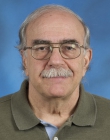
Donald Musa, whose more than 40-year Pitt career included a decade as director of the Qualitative Data Analysis Program (QDAP) at the University Center for Social and Urban Research (UCSUR), died Sept. 8, 2023.
Musa began his career at Pitt in 1978 as a research specialist and programmer/analyst for the Department of Industrial Engineering in the School of Engineering. After a decade, he joined UCSUR as a senior research associate/research specialist, becoming its QDAP director in 2008.
According to a remembrance from his department, Musa “was instrumental in QDAP, taking the lead on completely restructuring how the qualitative/open-ended student responses for Pitt’s Leavers/Student Retention interviews were coded and analyzed, the applications of which are still in place to this day.”
His research, often involving multiple Pitt schools, included developing, conducting and analyzing surveys on vaccine uptake and hesitancy, racial differences, equity issues and health, trust in medical research and self-care during chronic illness. He was published in leading peer-reviewed journals and was co-investigator or analyst on several grants.
In addition to his work at UCSUR, he was an adjunct assistant professor in the Department of Behavioral and Community Health Sciences at what was then the Graduate School of Public Health (2000-2013), teaching survey research methods. When he retired from Pitt in 2017, he took on a part-time role as senior analyst at UCSUR, working on several projects until shortly before his death.
Musa earned his master’s degree in sociology at Pitt in 1977 and his doctorate in public health in 2005. His career began as a research assistant at Penn State (1969-1972) and then as a researcher for Westinghouse Electric Corp. (1972-1977).
Rich Schulz, UCSUR director during the majority of Musa’s tenure there, recalled: “First and foremost, Don was an extraordinary human being who was universally liked and respected by his colleagues at the center and the University community more widely. He was kind, helpful and respectful toward people he interacted with and thoughtful and sophisticated in his scientific work. He published major papers on health disparities with more than a dozen faculty at the University, including me, and was a major architect and advocate of the Qualitative Data Analysis Program of UCSUR, a widely used resource for faculty throughout the University. He was one of those individuals who measurably improved the quality of life of those around him.”
Scott Beach, director of survey research for UCSUR, became Musa’s colleague and sometime collaborator beginning in 1993. For two decades they worked together on the provost’s office retention surveys, as well as other large-scale surveys of older adults and the state of aging. Beach was also a co-teacher with Musa on the Public Health survey methods class (2000-2009).
“Don was thoughtful and humble,” Beach recalled. “He was a really great scholar and very detail-oriented.”
After decades of friendship, Beach could only remember a few disagreements, and always over their working style, where Musa was slower and more deliberate. “But it was in the spirit of getting the work done,” Beach says. “He was quiet and unassuming — just a good colleague.”
Some of Musa’s most impactful work was in the QDAP program, Beach adds, studying the use of focus groups and in-depth interviewing, as well as in restructuring the way open-ended responses to survey questions were coded and analyzed.
Musa is survived by his brother, Gerald (Diane) Musa, and nephew Eric Musa. Memorial gifts are suggested to the American Cancer Society.
— Marty Levine
